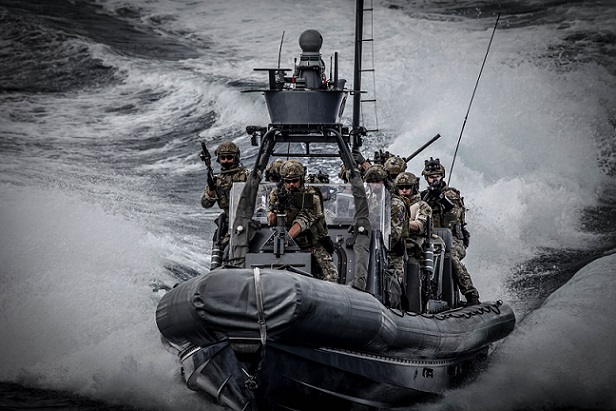
Foucault on War
Written by Anders Engberg-Pedersen, Professor at Department for the Studie of Culture
During the last decade of his life, Michel Foucault was intrigued by the problem of war.
“If God grants me life,” he stated, “after madness, illness, crime, sexuality, the last thing I would like to study, well, that is the problem of war and of the institution of war in what one might call the military dimension of society.” A few years earlier in 1975, gave an interview in which he identified with the soldier to such an extent that he transformed warfare into a method of historical analysis. “I am a munitions specialist,” he said. “I fabricate something that eventually functions as a siege, a war, a form of destruction…You then define the tactics you want to employ. Is it sapping? A siege? Is it the underground blast or the direct assault…Method, ultimately, consists in nothing other than this strategy.”
Like Foucault, we frequently use ‘war’ as a metaphor or a schema to redescribe fields that ostensibly have little to do with warfare. It has become a standard rhetorical ploy to say that society wages war on poverty, on illiteracy, on disease or on crime. Earlier this month, for example, two political scientists published a book with the title “War by Other Means: Geoeconomics and Statecraft.” Yet, what is the viability of the military metaphor? What happens when an empirical phenomenon is transformed into a metaphor that is subsequently used as a hermeneutical tool to analyze various non-military fields. A lecture series entitled Society must be defended that Foucault held at the Collège de France in the winter of 1976 might offer some clues. Not because of Foucault’s insights, but because of his difficulties and, ultimately, his failure.
Inverting Clausewitz’s famous dictum that warfare is the continuation of politics by other means, Foucault asked instead whether we might not conceive of society itself as a form of warfare. As he puts it: “Since when, how and why have we imagined that a kind of combat runs uninterruptedly through peace and that, ultimately, the civil order – in its foundation, in its essence, in its essential mechanisms – is an order of battle?” In other words, might society and the social contract mark not the end of war, but rather the continuation of it – only now it is fought with the more complex and elusive weaponry developed by the civil institutions? Might we think of war as the cipher of peace?
Foucault locates the origin of this thought figure in a rather obscure historical discourse among French and English historians beginning in the 17th century. In a fairly aloof analysis of Edward Coke, John Lilburne, Henri de Boulainvilliers, and l’abbé Sieyès, he detects the first coherent attempts to conceive of society as an invisible, but permanent state of war. And yet, right from the beginning, Foucault seems to be in doubt about his own project. Running through his lectures one finds an undercurrent of hesitation that manifests itself in recurring questions about the validity of the war schema itself. Early on he even suggests that the term ‘war’ “should be considerably modified, if not, perhaps, ultimately abandoned.” With its binary logic of absolute opposition, of victory and deafeat, the war schema may form too blunt an instrument to analyze the multiplicity of heterogenous force relations that pervade the social body.
Foucault carried the lectures through to the end, but his summary of the course published a few months later overflows with doubts about the very premise of the course: the inversion of Clausewitz’s dictum. In the end, he abandoned the military analysis of society, and his plans for a major new direction of his work never came to fruition.
The case of Foucault should give us pause when we encounter the rhetoric of war outside the realm of specifically military affairs. When war is tranformed from a brute empirical phenomenon into a metaphor the problem has only been articulated, not solved. What carries over, where does the concept end and the metaphor begin? Is ‘war’ a shorthand for “maximum effort” as W.J.T. Mitchell has suggested, or is it something else entirely?
One lesson, at least, is very simple: we need to read more closely. Given the prominence of the Prussian military theorist in Foucault’s lecture course, it is remarkable just how careless a reader of Clausewitz he is. At the very beginning of On War, Clausewitz distinguishes between war as an absolute phenomenon, and war as it actually unfolds with all the restrictions and modifications that obtain on the real. The statement that war is the continuation of politics by other means is one such restriction. But there are numerous other limiting factors such as its psychology and its complex epistemology. Clausewitz’s work is an examination of precisely these limitations and their centrality for the theory of war. Had Foucault cast more than a cursory glance at On War, or had he engaged with Clausewitz’s lectures on the nebulous character of partisan warfare, he would have encountered a much more nuanced understanding of war than the binary logic of his reductive war schema – an understanding that might have facilitated his attempt at an analysis of the military dimension of society. It may well be that the war schema is too blunt an instrument to account for the maze of human interactions in civil society. But even so, it is instructive to keep Foucault’s failure in mind when the next metaphorical war is declared.